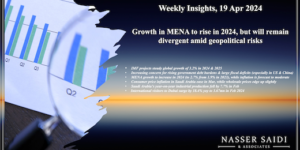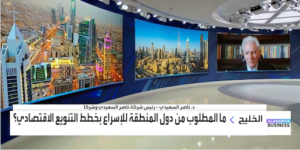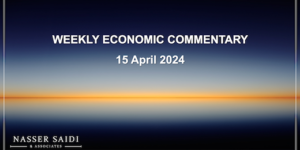Markets
Markets recovered last week, supported by news of the restart of US-China trade negotiations as well as the People’s Bank of China’s latest round of stimulus measure. Among regional markets, Dubai stood out recording the highest daily rise in more than 2 years (on news that Emirates NBD was seeking to raise its foreign ownership limit). Among currencies, the pound hit a 5-week high while among commodities, crude prices gained on the week while gold price lost its safe-haven shine.
Global Developments
US/Americas:
- US ISM manufacturing fell to 49.1 in Aug – the lowest reading since Jan 2016 – from the previous month’s 51.2. This below-50 reading ended a 35-month expansion period where the PMI averaged 56.5. ISM’s new export orders slowed for the second month in a row to their lowest reading since Apr 2009.
- Factory orders increased for the second consecutive month, rising 1.4% mom (and 0.4% yoy) in Jul from a downwardly revised 0.5% mom in Jun. while transportation equipment orders surged 7% (the largest increase since Aug 2018), orders for non-defense capital goods excluding aircraft grew slightly by 0.2% (Jun: + 0.4%).
- US trade deficit narrowed by 2.7% mom to a seasonally adjusted USD 54bn in Jul. Exports grew by 0.6% mom (thanks to an uptick in consumer goods shipment) while imports dipped by 0.1% (dragged down by capital goods shipments).
- ADP reported that US companies added 195k private sector jobs in Aug. About 100k new jobs were created in the education and health services (58k) and the leisure and hospitality industries (42k).
- Initial jobless claims marginally increased by 1k to 217k for the week ended Aug 31 and the four-week moving average was up by 1500 to 216,250.
- US non-farm payrolls grew by 130k in Aug (given the temporary hiring of Census workers), following Jul’s reading of 159k. Job growth has averaged 158k per month thus far this year, below the average monthly gain of 223k in 2018. Average hourly earnings increased by 0.4% mom and 3.2% yoy in Aug while the unemployment rate remained unchanged for the third month in a row at 3.7%.
- Non-farm productivity in the US rose at an unrevised 2.3% annualized rate in Q2.
Europe:
- UK’s Parliament voted through a bill to block a no-deal Brexit and rejected PM Johnson’s call for a snap election on 15 Oct.
- German manufacturing activity remained close to Jul’s seven-year low – with a reading of 43.5 in Aug, as weaker demand led to a decline in new orders, while producers scaled back output, and job losses rose steeply. The composite index rose to 51.7 in Aug from 50.9 in Jul, after the services sector improved to 54.8 in Aug (Jul: 54.5).
- German factory orders fell 2.7% mom in Jul, after new orders from foreign buyers dropped by 6.7% mom; domestic orders were down by 0.5% while orders from the euro area was up 0.3%.
- Industrial production in Germany unexpectedly slumped by 0.6% mom in Jul (Jun: -1.1%), driven by a decline in the production of capital goods.
- EU manufacturing PMI improved to 47 in Aug (Jul: 46.5), fueled by deteriorating exports and largely due to Germany. Services PMI continues to be resilient, rising to 53.5 (Jul: 53.2), and as a result composite PMI edged up to 51.9 in Aug (Jul: 51.5).
- In the UK, manufacturing PMI dropped to 47.4 in Aug (Jul: 48) – the lowest levels since Jul 2012 – while the all-sector PMI fell to 49.7 in Aug (Jul: 50.3).
- UK construction PMI declined to 45 in Aug (Jul: 45.3), as new orders fell for a fifth consecutive month to 40 – the lowest reading since Mar 2009.
Asia Pacific:
- The People’s Bank of China announced further cuts in banks’ reserve requirements by 50bps to free up around CNY 900bn (USD 126.4bn) in funds for lending (the third time this year). The move is effective from Sep 16 with additional targeted cut taking place on Oct 15 and Nov 15.
- China Caixin manufacturing PMI ticked up to 50.4 in Aug from Jul’s 49.9. with new orders staying above 50 though inching down from the previous month. Services PMI rose to a 3-month high of 52.1 in Aug (Jul: 51.6), thanks to a 4-month high in new orders. The composite index roseto a four-month high of 51.6 in Aug from 50.9 in Jul.
- China foreign reserves increased to USD 3.1072trn, after reporting a dip in Jul.
- Korea GDP growth was revised down to 1% qoq in Q2 (from the preliminary estimate of 1.1% gain), on weaker exports (revised down to 2.0% vs 2.3%).
- Inflation in Korea was unchanged in yoy terms in Aug, hitting a record low – the lowest since inflation data was released in 1965. Farm products prices plunged 11.4% yoy as weather improved while core inflation excluding volatile food and energy prices was 0.8%.
- Japan’s overall household spending grew for the 8th consecutive month, rising 0.8% yoy in Jul (Jun: 2.7%). Spending is likely to remain resilient ahead of the scheduled sales tax hike in Oct (to 10% from 8%).
- Japan’s preliminary reading of the leading economic index remained unchanged at 93.6 in Jul while the coincident index of business conditions increased to 99.8.
Bottom line: Global economy continues to lose momentum – the JPMorgan Global PMI fell to 51.3 in Aug, near a 3-year low, largely driven by the decline in global trade (which dropped for a 12th consecutive month in Aug; goods exports fell at the sharpest rate since Oct 2012. Chart: https://cdn.ihs.com/www/blog/2393258_2393266_1.0.PNG). Data from the EU indicate a weak Q3 and support the case for ECB to unveil its stimulus package at the Sep 12 meeting (Chart: how long can the ECB go?) while in the UK, Brexit uncertainty (PM Johnson plans a 2nd bid to trigger snap elections) and risk of recession continues (the Bank of England predicts a one-in-three chance the economy will shrink in yoy terms by early-2020). Political drama continued in Italy (its 67th government in power since World War II) as well while Argentina imposed capital controls.
Regional Developments
- Bahrain’s National Bureau for Revenue called for the VAT registration of entities generating/ expecting to generate between BHD 18,750-500k in taxable supplies in annual taxable supplies. More than 4,500 entities have registered since VAT launched on Jan 1.
- Bilateral trade between Bahrain and UK touched GBP 1.1bn as of end-Mar 2019, up 9% from the previous year, according to the British Ambassador to the country. He also stated that 75% of the two-way trade was in goods and the rest services-related.
- Egypt’s non-oil private sector activity slips back into contractionary territory– the PMI dipped to 49.4 in Aug (Jul: 50.3), as a result of “mild declines in output and new orders”. However, optimism about future activity touched an 18-month high, with nearly 51% of respondents predicting improved activity next year while only 4% estimate a contraction.
- Non-oil exports from Egypt grew by 2% yoy to USD 2.021bn in Jul, with industrial exports accounting for 83.8% of the total.
- Gold reserves at Egypt’s reached a record high of USD 3.32bn in Aug (+8.6% mom). Net foreign reserves grew by 0.12% mom to USD 44.969bn by end-Aug.
- According to its Executive Chairman, Egypt’s stock market plans two more listings before year-end, in addition to introducing short-selling. Foreigners, who account for 35% of trading on the exchange, have purchased nearly USD 3bn of securities since 2016.
- Egypt’s second phase of state privatisation has been postponed to Jan 2020, from the planned date of Sep this year, revealed the public enterprise minister. The plan is for 10 state-run companies (including eight industrial and mining companies) to be listed on the EGX in this second phase.
- Egypt’s fuel subsidies fell to EGP 85bn (USD 5.15bn) in 2018-19 from EGP 120.8bn a year ago. Fuel prices were raised by almost 50% in Jun 2018, and then again by 30% in Jul 2019.
- Egypt expects a budget deficit of 7.2% in fiscal year 2019-2020 compared to last year’s 8.2%, as per the finance minister. The nation also aims to clock in a primary surplus of EGP 124bn (USD 7.51bn) versus the previous fiscal year’s EGP 104bn (2% of GDP).
- Public debt to GDP ratio fell in Egypt to 90.5% at end-Jun 2019, from 108% in Jun 2017, revealed the finance minister. He also stated that the aim is to reduce this to 82.5% in 2020 and to 77.5% in 2022.
- Egyptian banks’ local deposits increased by 0.9% mom to a record-high EGP 2.68trn in Jul. Foreign-currency deposits fell to EGP 708.63bn from Jun’s EGP 714.6bn.
- Starting Sep 1, Egypt’s ministry of finance replaced the monthly customs rate with one set on a daily basis as per exchange rates announced by the central bank. The monthly system was set in Jan 2017 to stabilize the rate following the floating of the EGP.
- Egypt’s natural gas production increased to 7bn cubic feet (bcf) per day from a level of 6.8 bcf per day at the end of Jun, reported Reuters, citing a senior petroleum official.
- Crude oil exports from Iraq increased to 3.603mn barrels per day (bpd) in Aug from 3.566mn bpd the month before, as per the oil ministry.
- Jordan’s trade deficit narrowed by 8.8% yoy in H1 this year,thanks to a 4.5% rise in exports (to JOD 2.257bn) alongside a 3.8% dip in imports (to JOD 6.597bn).
- Unemployment in Jordan increased to 19.2% in Q2: high youth unemployment continues at 46% and 40% respectively for the 15-19 and 20-24 age groups. Separately, the Social Security Corporation revealed that about 630k persons were covered by unemployment insuranceand that more than 90k subscribers have benefitted from it (since 2011) having been provided over JOD 77mn during periods of unemployment.
- Kuwait’s trade surplus edged up by 1.3% yoy to KWD 5.05bn (USD 16.7bn) in H1 this year. Imports were down 3.9% to KWD 5.11bn during the period while exports also declined by 1.3% to KWD 10.16bn.
- The Boursa Kuwait IPO received an approval from the CMA: the listing, which is expected to happen in Q4 this year, will see the distribution of the CMA’s 50% stake in the company to citizens.
- Kuwait’s airport welcomed 1.7m passengers in Aug, up 3% yoy, compared to Jul’s 1.36mn (+12% yoy).
- Lebanon’s PMI inched up to 47.8 in Aug (Jul: 47.7), thanks to a softer decline in total new orders, but remained in contractionary territory.
- Lebanon declared a “state of economic emergency” last week, with the PM stating that emergency measures would be taken to speed up economic reforms. S&P warned that the central bank had enough foreign currency reserves to last only for a year, and the reserves’ continued depletion could test the currency peg and also trigger a downgrade to CCC rating.
- Oman’s GDP fell by 1.6% yoy in Q1 2019, totaling OMR 7.066bn (USD 18.4bn); oil GDP also fell by 0.5% yoy to OMR 2.412bn due to lower oil prices.
- Nearly 750k persons visited Salalah in Oman during the Khareef season this year. About 71.1% were domestic tourists, 7.8% from UAE and 9.8% other GCC nationals.
- Saudi Arabia’s PMI rose to 57.0 in Aug from Jul’s 5-month low of 56.6, supported by output growth (60.7 from Jul’s 59.2) and new orders (63.5 from 63.4). However, new export orders declined to 52.7 from 53.2 and employment levels remained subdued (50.1 vs 50.4).
- Saudi Arabian bond market increased by 29% in volume to USD 25.6bn from 8 deals in H1 this year, according to a report by Debtwire Par. Loan market meanwhile witnessed a 53% yoy drop in volume (to USD 9.8bn) while the number of deals almost doubled to 13.
- Saudi banks’ holdings of government bonds surged by 25.08% yoy to SAR 358.53bn in Jul, according to SAMA data.
- Remittances from Saudi Arabia declined by 5.86% yoy to SAR 11.46bn (USD 3.06bn) in Jul. On a monthly basis, remittances were up by 31.5%.
- Saudi Arabia will launch a new tourist visa on Sep 27– with a fee of SAR 300 (USD 80 or EUR 70) plus SAR 140 for medical insurance – allowing citizens of 51 countries to visit. With a validity of 1 year, the visa can be applied via an electronic platform or visa on arrival.
- According to Mastercard’s Global Destination Cities Index, Dubai topped the visitor spending list (USD 30.82bn in total and an average spend of USD 553), followed by Makkah (USD 20.09bn) and Bangkok (USD 20.03bn). Bangkok remained the most visited city (22.78mn international overnight visitors) followed by Paris (19.1mn), London (19.09mn), Dubai (15.93mn) and Singapore (14.67mn).(GDCI report: https://newsroom.mastercard.com/wp-content/uploads/2019/09/GDCI-Global-Report-FINAL-1.pdf)
UAE Focus
- UAE’s non-oil private sector growth falls: PMI fell to an 8-year low of 51.6 in Aug (Jul: 55.1). Output growth rate was at its weakest in just over six years, while employment slipped to 49.9 in Aug (Jul: 50.5).
- The manufacturing sector’s contribution to the UAE’s non-oil GDP grew 2.5% yoy to AED122bn in real prices in 2018.
- Dubai announced the formation of a higher committee for real estate planning, to rebalance the industry. Sheikh Mohammed also tweeted that he wants committee to ensure that “semi-government real estate companies in Dubai won’t compete with private sector investors” and draw up a 10-year strategic plan for the sector.
- Dubai’s Emirates airline will stay and maintain operations at its Dubai International airport hub for another 10 years, as the completion of the Dubai World Central airport gets pushed back to 2030. (More: https://www.bloomberg.com/news/articles/2019-09-04/emirates-aims-to-stay-put-for-a-decade-as-new-dubai-hub-falters)
- Dubai welcomed more than 1.4 million passengers in the last two weeks of Aug, according to an official in the General Directorate of Residency and Foreign Affairs.
Media Review
King Salman appoints son as Saudi energy minister
https://www.ft.com/content/1fec0b64-d1bd-11e9-8367-807ebd53ab77
China finds it can live without the US
https://www.wsj.com/articles/china-finds-it-can-live-without-the-u-s-11567551458
The true toll of the trade war
https://www.project-syndicate.org/commentary/trump-trade-war-damage-by-raghuram-rajan-2019-09
ECB’s Draghi faces up to super-charged market expectations
https://www.ft.com/content/0747299a-cffb-11e9-b018-ca4456540ea6
China says new digital currency will be similar to Facebook’s Libra
https://www.reuters.com/article/us-china-cryptocurrency-cenbank/china-says-new-digital-currency-will-be-similar-to-facebooks-libra-idUSKCN1VR0NM
What should be next for Aramco?
https://www.bloomberg.com/view/articles/2019-09-04/saudi-aramco-s-new-chairman-al-rumayyan-isn-t-right-man-for-job
Dubai sees ‘significant shift’ from luxury to affordable housing
https://www.arabianbusiness.com/news/427163-dubai-sees-significant-shift-from-luxury-to-affordable-housing
The world is investing less in clean energy
https://www.economist.com/graphic-detail/2019/09/05/the-world-is-investing-less-in-clean-energy
Powered by:







